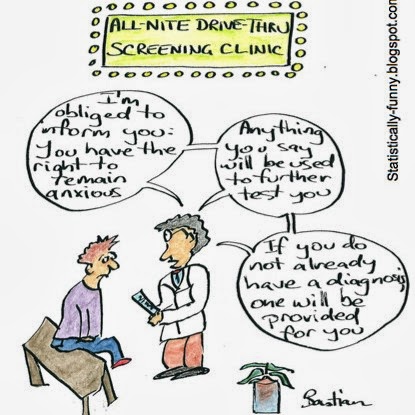DIAGNOSIS: Worried about minor memory changes? The British Medical Journal revealed how unnecessary tests led to a 23% over-diagnosis rate. Learn the risks, harms & costs to individuals, families and societies.
The British Medical Journal is warning that a political drive to screen older people for minor memory changes is leading to unnecessary investigation and potentially harmful treatment for what is arguably an inevitable consequence of ageing.
Their statement coincided with the Preventing Overdiagnosis conference in New Hampshire, USA, partnered by BMJ’s Too Much Medicine campaign, where experts from around the world will gather to discuss how to tackle the threat to health and the waste of money caused by unnecessary care.
A team of specialists in Australia and the UK say that expanding diagnosis of dementia will result in up to 65% of people aged over 80 having Alzheimer’s disease diagnosed – and up to 23% of non-demented older people being labeled with dementia.
They argue this policy is not backed by evidence and ignores the risks, harms and costs to individuals, families and societies. It may also divert resources that are badly needed for the care of people with advanced dementia.
Over-Diagnosis Summary
- Clinical context—Dementia is age related and with an ageing global population is predicted to become an overwhelming and costly problem
-
Diagnostic change—Introduction of broader diagnostic criteria for mild cognitive impairment and pre-dementia based on new cognitive screening tests coupled with cerebrospinal fluid biomarkers and neuroimaging
-
Rationale for change—Past neglect of services and research in dementia has fuelled international calls for action and earlier treatment
-
Leap of faith—People with mild symptoms will eventually develop dementia and interventions are more likely to be effective at an early stage
-
Impact on prevalence—The current prevalence of dementia is thought to be 10-30% in people over the age of 80, but the adoption of new diagnostic criteria will result in up to 65% of this age group having Alzheimer’s disease diagnosed and up to 23% of non-demented older people being diagnosed with dementia
-
Evidence of overdiagnosis—Screening for cognitive impairment and measurement of biomarkers and neuroimaging are increasing the diagnosis of mild cognitive impairment, which in many people will improve spontaneously
-
Harms from overdiagnosis—Unnecessary investigation and treatments with side effects; adverse psychological and social outcomes; and distraction of resources and support from those with manifest dementia in whom need is greatest
-
Limitations—Current case identification and screening policy relies mostly on anecdotal and observational data from potentially biased sources, including those with vested commercial interests, rather than evidence from clinical trials. There is a lack of research focused on older people, in whom dementia is most prevalent
-
Conclusions—Current policy is rolling out untested and uncontrolled experiments in the frailest people in society without a rigorous evaluation of its benefits and harms to individuals, families, service settings, and professionals
Dementia is age related and with an ageing population is predicted to become an overwhelming and costly problem. But the evidence suggests that while 5 – 15% of people with mild cognitive impairment will progress to dementia each year, as many as 40 -70% will not progress and indeed their cognitive function may improve. Studies also show that the clinical tools used by doctors to diagnose dementia are not robust, and that many people who develop dementia do not meet definitions of mild cognitive impairment before diagnosis. But this has not deterred countries from developing policies to screen for pre -dementia.
For example, in the US, the Medicare insurance programme will cover an annual wellness visit to a physician that includes a cognitive impairment test. In England, the government has announced that it will reward general practitioners for assessing brain function in older patients – and has committed to have “a memory clinic in every town and every city” despite no sound evidence of benefit.
This had led to the development of imaging techniques and tests that are increasingly used in diagnosis, despite uncertainty over their accuracy, say the authors. The researchers say however, that until such approaches are shown to be beneficial to individuals and societies they should remain within the clinical research domain.
Furthermore, there are no drugs that prevent the progression of dementia or are effective in patients with mild cognitive impairment, raising concerns that once patients are labelled with disease or pre-disease, they may try untested therapies and run the risk of adverse effects.
They also question whether ageing of the population is becoming a “commercial opportunity” for developing screening, early diagnosis tests and medicines marketed to maintain cognition in old age.
The desire of politicians, dementia organisations, and academics and clinicians in the field to raise the profile of dementia is understandable, write the authors, “but we risk being conscripted into an unwanted war against dementia.”
They suggest that the political rhetoric expended on preventing the burden of dementia would be much better served by efforts to reduce smoking and obesity, given current knowledge linking mid-life obesity and cigarettes with the risk of dementia.
“Current policy is rolling out untested and uncontrolled experiments in the frailest people in society without a rigorous evaluation of its benefits and harms to individuals, families, service settings, and professionals,” they conclude.













I think that test in picture is really ridiculous. Even a normal young people can not remember what he or she has did on a certain day of last year. How about an ole man or woman? I think this should be prevented.
I think dementia is being overdiagnosed and this is because drug companies are scaremongering our society into getting memory tests which usually lead to a lifetime of drugging Good for them but not always the best idea for the patient These drugs have side effects and cause other problems to an older person . The most healthiest people on the planet are those who do not take a lot of tablets Psychotropic drugs are especially dangerous to the elderly . I think doctors should prescribe drugs mopre carefully Also having memory problems IS a symptom of old age It always has been , just like getting arteritis and poor eyesight. Old people are being overly drugged nowadays and it is very unfair
I think MCI is a real BS diagnosis. There is no definitive test for it, yet doctors diagnose millions of cases each every year.
A diagnosis of MCI can leave you understandably confused and concerned and doctors have nothing to offer. Makes one wonder what's the point of diagnosis?
You, and this article, are wrong! I was diagnosed with MCI in February of 2011 and started on Namenda. It helped me with my memory and other symptoms a lot. So we added Aricept and that combination has saved my brain and enabled me to continue working. I am now 65 and still working full-time as a psychologist in private practice. My long-term clients have been through it with me, from me not remembering crucial elements of their cases to the improvement on Namenda to the very significant improvement with the addition of Aricept! My problems are not cured but are being very well managed on these medications. I still have occasional lapses, and don't know if I am in the very earliest stages of Alzheimer's, but am SO much better now. If not for Aricept and Namenda, and my wonderful neurologist, I would be unable to work and would have had to go on disability!
Appreciate the feedback. Though the article reports on overall trends, there is nothing to replace real-life experience.
Hello, wow!
Richard